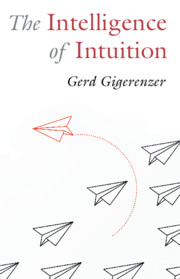Book contents
- The Intelligence of Intuition
- The Intelligence of Intuition
- Copyright page
- Dedication
- Contents
- Figures and Tables
- Preface
- Acknowledgments
- Chapter 1 We Know More Than We Can Tell
- Part I The War on Intuition
- Chapter 2 Female Intuition Versus Male Reason
- Chapter 3 Biases: Mistaking Intuition for Irrationality
- Chapter 4 Governmental and Technological Paternalism
- Part II Intuition and Its Intelligence
- References
- Index
Chapter 2 - Female Intuition Versus Male Reason
The Battle for Intelligence*
from Part I - The War on Intuition
Published online by Cambridge University Press: 28 September 2023
- The Intelligence of Intuition
- The Intelligence of Intuition
- Copyright page
- Dedication
- Contents
- Figures and Tables
- Preface
- Acknowledgments
- Chapter 1 We Know More Than We Can Tell
- Part I The War on Intuition
- Chapter 2 Female Intuition Versus Male Reason
- Chapter 3 Biases: Mistaking Intuition for Irrationality
- Chapter 4 Governmental and Technological Paternalism
- Part II Intuition and Its Intelligence
- References
- Index
Summary
I distinguish three versions of the idea of a peculiarly female intelligence, each devised by men to explain and justify their superior social position. First, from Aristotle through to the nineteenth century, the difference was understood in terms of polarities, e.g., female intuition version male reason. Abilities such as abstract thought, considered alien to women, were seen as indispensable for grasping moral principles. Influenced by Darwin’s theory of evolution, Francis Galton replaced the polarities with a single continuous general intelligence (“natural ability”), which be believed was inherited by men and women. This second version granted women and men the same kind of intelligence, although women, on average, were believed to have less of it. In the early twentieth century, Louis Terman put an end to this view by eliminating particular items from the Stanford-Binet test so that the means of male and female intelligence were the same – otherwise, female means would, in fact, have been higher. A third version, promoted by the sexologist Havelock Ellis, again attempted to defend male hegemony by asserting that women have lower variability in physical and mental traits.
Keywords
- Type
- Chapter
- Information
- The Intelligence of Intuition , pp. 21 - 41Publisher: Cambridge University PressPrint publication year: 2023



